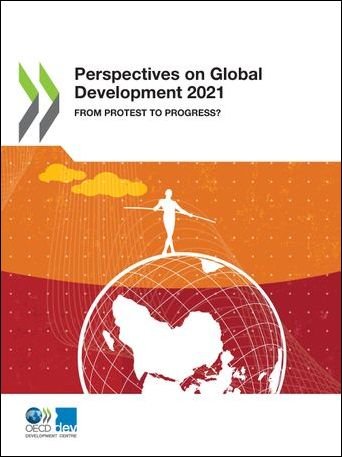- Share this article
- Subscribe to our newsletter
Perspectives on Global Development 2021
Recovery will not create fairer societies and more sustainable economic models unless governments listen to, engage with and empower groups that have been marginalised up to now, according to Perspectives on Global Development 2021: From Protest to Progress? launched by the Organisation for Economic Co-operation and Development (OECD) in July 2021. If governments fail to do so, the report expects discontent to return strongly in the aftermath of the pandemic.
The report analyses the many factors behind the growing discontent in developing countries during the last decade. Making ends meet was the main concern for many people: despite three decades of near-continuous economic growth, a large proportion of the population in developing countries was struggling to get by, even before the pandemic struck. People are also demanding better public services, less corruption and more of a say in the way their country is run, as well as greater action on climate change. In addition, the report shows that the quality of democracy is deteriorating around the world.
Extremely difficult to build back better
The report finds that discontent emerges from the interaction of these grievances with the fragmentation of societies: around the world, trust between people is declining, civil engagement is weakening, and culture wars are emerging. It also examines the political factors behind the emergence of populist movements and explains why these are typically unable to address the challenges that societies confront. The report sheds light on the complex links between inequality and discontent, and it examines the impact of digital technologies, which tend to exacerbate trends in the real world.
The collapse of social cohesion and breaches in the social contract will make it extremely difficult to build back better. The report argues that governments must engage with citizens to mend these fault lines, chart a common course and create spaces for change. It outlines how inclusive and participatory approaches to transforming the economy, strengthening institutions, tackling poverty and confronting the climate crisis can help rebuild societies after the pandemic and unlock longer-term development challenges, provided that they are well designed and backed up by a genuine transfer of power and resources.
Need for new approaches to international cooperation
Yet developing countries cannot address these challenges alone. As the report explains, discontent is in many ways a global phenomenon. Developing countries are highly vulnerable to factors beyond their borders, as recent economic crises, environmental disasters and, of course, pandemics have demonstrated. International cooperation is critical to meet these threats, but multilateral institutions confront doubts concerning their legitimacy and effectiveness, particularly in addressing the needs of developing countries.
The COVID-19 pandemic, which continues to worsen in many developing countries, has underlined the need for new approaches to international cooperation. In the short term, the international community has a crucial role to play in ensuring developing countries can access the vaccines and other supplies they need to fight the pandemic, averting a number of emerging humanitarian crises and coordinating debt relief. Over the longer term, the Sustainable Development Goals and the Paris climate agreement provide a roadmap to addressing the many causes of discontent identified in this report but cannot be achieved without truly inclusive global institutions to match their universal ambitions.
(OECD/ile)
Read more and download the report Perspectives on Global Development 2021 at OECD website





Add a comment
Be the First to Comment